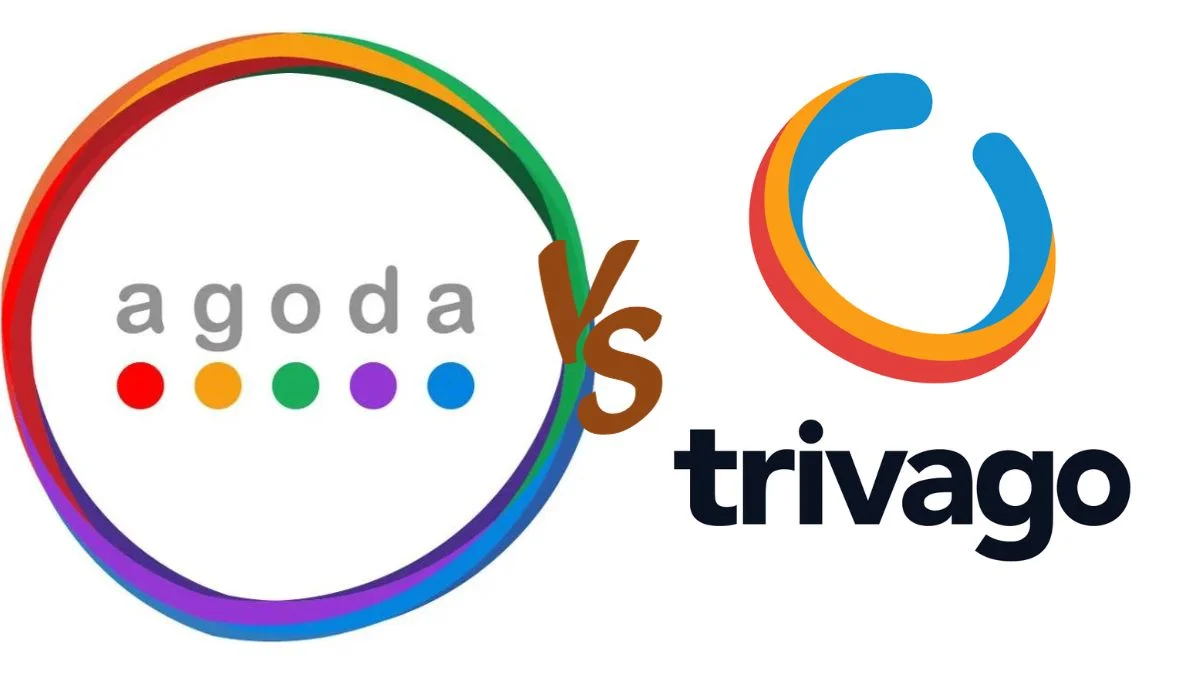Agoda vs. Trivago: Navigating the Differences Between Two Major Travel Booking Services

As participants in Amazon Associates and other programs, we earn from qualifying purchases. This comes at no additional cost to you. For more details, see our Affiliate Disclosure.
In the vast landscape of online travel booking platforms, Agoda and Trivago emerge as two prominent names, often sparking curiosity among travelers about which service might suit them best. While both platforms cater to globetrotters looking for the ideal accommodations, they come with their own unique offerings and user experiences. This article delves deep into the nuances of each, helping you navigate and decide which might be the best fit for your next adventure.
HIGHLIGHTS
- Agoda offers a comprehensive review system from verified bookings and has strong hotel partnerships, particularly in Asia, leading to exclusive deals.
- Trivago stands out as a meta-search engine, aggregating listings from multiple platforms, ensuring a broad view of rates and accommodations worldwide.
- In terms of overall user experience, including reviews, customer support, and exclusive benefits, Agoda emerges as the overall preferred platform.
- However, for travelers who prioritize price comparisons across multiple sources, Trivago remains an essential tool.
Core Features: What Sets Each Platform Apart?
In the bustling realm of online travel bookings, both Agoda and Trivago come equipped with distinctive features designed to cater to diverse traveler needs.
Agoda, for instance, is renowned for its “Secret Deals” which unlock special discounted rates once a traveler commits to a booking. This feature offers an enticing element of surprise, often presenting rates lower than what’s conventionally visible.
On the other hand, Trivago stands out with its comprehensive “Meta-search Engine,” a powerful tool that aggregates and compares prices from various hotel booking sites. This ensures that travelers receive a consolidated view of available options, making it easier to find the best deals at a glance.
Secret Deals (Agoda)
Agoda’s Secret Deals is a feature that embodies the essence of a pleasant surprise. When users browse for accommodations, certain listings are tagged with a ‘Secret Deal’ label. The exact price and sometimes the full details of the property remain hidden until the user decides to book.
This approach not only adds an element of excitement to the booking process but also offers competitive rates, often better than standard listings. For travelers willing to take a little leap of faith, Secret Deals can lead to significant savings.
Meta-search Engine (Trivago)
At the heart of Trivago’s functionality is its meta-search engine. Unlike typical booking platforms that list their own curated properties, Trivago pulls in listings from various other booking sites, presenting users with a comprehensive comparison of prices and features.
This ensures that travelers aren’t just limited to one platform’s offerings. Instead, they get a bird’s eye view of what multiple platforms have to offer for a specific hotel or location. This expansive insight is invaluable for deal-seekers aiming to secure the most bang for their buck.
User Experience: Navigating the Interfaces
The user experience can often be the decisive factor in determining a traveler’s loyalty to a booking platform. A seamless, intuitive interface not only ensures efficient browsing but also minimizes booking errors. Both Agoda and Trivago have invested significantly in their respective user interfaces, but they approach user experience with slightly different emphases.
Agoda’s User-Centric Design
Agoda’s website and mobile application are designed with simplicity and ease of use in mind. The platform presents a clean layout with clearly labeled sections and minimalistic design elements, ensuring that users aren’t overwhelmed.
One of Agoda’s standout features is its adaptive search functionality, which tailors search results based on user behavior and previous bookings. Additionally, filters and sorting options are prominently displayed, allowing travelers to quickly refine their search based on criteria like price, location, and guest ratings.
The booking process itself is streamlined, often requiring just a few clicks, and the post-booking management tools are intuitive, making modifications or cancellations straightforward.
Trivago’s Comprehensive Yet Clean Approach
Trivago, as a meta-search engine, has the challenging task of presenting vast amounts of information without creating visual clutter. And, by and large, it succeeds. Its homepage is anchored by a large search bar, urging users to begin their journey.
As search results populate, they are organized in cards, each highlighting the price differences from various platforms, making it easy for users to spot the best deal. The interface is responsive, adjusting seamlessly to various screen sizes, which is particularly handy for mobile users.
A notable feature is the sliding price scale, which allows users to set their budget range dynamically, watching in real-time as the available options adjust. Trivago’s color-coded rating system, which amalgamates reviews from different sources, also aids users in making informed decisions quickly.
While both platforms strive to offer a user-friendly experience, Agoda leans towards personalized adaptability, and Trivago excels in presenting consolidated information in a digestible format.
Pricing and Discounts: A Comparative Look at Deals and Offers
In the competitive realm of online travel booking, pricing and discounts play a pivotal role in attracting and retaining customers. Both Agoda and Trivago have distinctive approaches to ensuring their users get the best deals, but how do they stack up against each other?
Agoda’s Direct Discounts and Loyalty Perks
Agoda has a reputation for providing some of the most competitive direct discounts in the industry.
The platform often collaborates with hotel partners to offer exclusive deals, which are sometimes even lower than what the hotels provide on their own websites. Adding to this, Agoda’s PointsMAX program allows users to earn points for their preferred loyalty programs, effectively giving a dual benefit with each booking.
Their “Price Match Guarantee” further instills confidence, promising to match or beat any price if a user finds a lower rate elsewhere for the same accommodation and dates.
Trivago’s Price Comparison Advantage
Trivago’s core strength lies in its meta-search capabilities. Instead of offering direct discounts, Trivago aggregates prices from various booking sites, ensuring users always have a comprehensive view of available deals for a specific accommodation.
This means that if a particular booking site has a special offer or discount, it will be visible on Trivago. For deal-hunters, this is an invaluable tool as it eliminates the need to jump from one site to another comparing rates.
Moreover, Trivago’s “Top Deals” section showcases accommodations offering significant value for money, making it easier for users to spot bargains.
Determining a clear winner between Agoda and Trivago in terms of pricing and discounts is challenging because their strengths lie in different areas. However, if one has to choose based on sheer consistency and the ability to always present the best deals from across the web, Trivago edges out slightly.
Its comprehensive price comparison feature ensures users can always spot the most competitive rate, making it an invaluable tool for those seeking the best deals. However, for those loyal to specific hotel chains or looking for direct discounts and loyalty rewards, Agoda remains a strong contender.
Geographical Coverage: Where Can You Book?
The breadth of geographical coverage is crucial for travelers, especially for those with wanderlust looking to explore off-the-beaten-path destinations. While most major travel booking platforms cover the popular cities and tourist hubs, the real test lies in how extensively they cater to lesser-known locales. Both Agoda and Trivago have made efforts to provide wide geographical coverage, but do they measure up equally?
Agoda’s Extensive Asian Network
Agoda, originally from Asia, has a particularly strong foothold in the Asian market. This means travelers looking to explore destinations in Asia, from bustling cities to remote islands, are likely to find a wide range of accommodations on Agoda.
Over the years, Agoda has expanded its reach globally, but its strength undoubtedly remains in its home territory. The platform boasts of exclusive deals and partnerships with hotels and properties in Asia, which might not be as prevalent on other global platforms.
Trivago’s Global Meta-search Power
Trivago’s meta-search capability gives it an inherent advantage in terms of geographical coverage. Since it aggregates listings from various hotel booking sites, Trivago boasts an expansive network that spans the globe. Whether it’s Europe, the Americas, Africa, or Oceania, Trivago ensures that users have multiple options wherever they plan to travel.
This broad reach is further accentuated by Trivago’s localized websites, catering to various regions with language and currency specifications, making it user-friendly for a global audience.
While Agoda’s dominance in the Asian market is commendable, offering travelers unparalleled options in this region, Trivago takes the lead when it comes to overall geographical coverage.
Its meta-search functionality, combined with partnerships with numerous booking platforms globally, ensures that travelers have a wealth of choices no matter where they’re headed. Trivago’s ability to offer localized experiences in various regions further strengthens its position as the go-to platform for global geographical coverage.
Customer Support: Assessing the Reliability and Reachability
In the world of online travel booking, impeccable customer support can make all the difference. While technology ensures ease and efficiency, human touch, in the form of responsive and reliable support, becomes paramount, especially when unforeseen issues arise. Both Agoda and Trivago understand this importance, but how do their customer support services compare?
Agoda’s Multi-channel Support System
Agoda offers a robust customer support infrastructure. With dedicated helplines available in multiple languages, they cater to a global clientele effectively. Their website also features a comprehensive FAQ section, addressing a wide array of common queries and concerns.
For those who prefer written communication, Agoda offers email support and a live chat option. The platform also makes an effort to respond promptly to queries raised through social media channels. Many users have commended Agoda for their swift problem resolution, especially when it comes to booking modifications or cancellations.
Trivago’s Informative Approach
Given that Trivago primarily operates as a meta-search engine, its direct customer interaction is a bit different from typical booking platforms. Instead of handling bookings directly, Trivago directs users to third-party booking sites.
As such, their customer support is more focused on providing information and addressing issues related to their platform. They have a detailed FAQ section on their website, covering topics from search functionalities to account management.
For direct assistance, Trivago provides email support. However, when it comes to issues related to specific bookings, customers are often redirected to the respective booking platform they used.
When it comes to reliability and reachability, Agoda emerges as the clear winner. Their multi-channel support system, coupled with dedicated helplines in various languages, ensures that customers have multiple avenues to seek assistance.
While Trivago’s support is efficient in its domain, its nature as a meta-search engine means that for booking-specific concerns, users might have to navigate the additional step of reaching out to the third-party booking platform. Agoda’s direct handling of customer queries and concerns provides a more seamless support experience.
Mobile Experience: Analyzing the Mobile Apps and Features
In today’s digital age, where smartphones have become the primary travel companions for many, a seamless mobile experience is crucial for any online service. Travelers often rely on mobile apps not only for booking but for last-minute changes, updates, and on-the-go decisions. Agoda and Trivago, being major players in the travel booking industry, have invested in their mobile platforms. But how do they fare when pitted against each other?
Agoda’s Mobile Mastery
Agoda’s mobile app, available for both iOS and Android, is a testament to the brand’s commitment to providing a user-centric experience. The app mirrors the simplicity and efficiency of the desktop site but optimized for smaller screens.
Features like interactive maps, real-time availability checks, and in-app exclusive deals make the booking process effortless. Additionally, the app provides instant booking confirmations, saving travelers from potential anxieties.
One of the standout features is the offline access to booking details, crucial for areas with spotty internet connections.
Trivago’s Responsive and Informative App
Trivago’s app, also available on iOS and Android platforms, provides a clean and intuitive interface. As with its website, the app emphasizes price comparisons, presenting users with clear visuals of potential savings across different platforms.
The search functionality is fluid, and the filter options, ranging from price to ratings to amenities, ensure users can hone in on their preferred choice quickly.
A unique feature is Trivago’s “Save” option, allowing users to bookmark accommodations for later consideration, perfect for those in the initial stages of travel planning.
Both Agoda and Trivago offer commendable mobile experiences, tailored to meet the needs of modern travelers. However, if we were to pick based on added functionalities and the overall seamlessness of the experience, Agoda takes a slight edge.
The provision of offline access to booking details and in-app exclusive deals gives it a distinct advantage, especially catering to travelers on the move in regions where internet connectivity might be inconsistent.
User Reviews and Ratings: What Are Travelers Saying?
Feedback from fellow travelers often holds significant weight when deciding on accommodations or even when choosing a booking platform. A reliable rating system and genuine user reviews can provide invaluable insights, ensuring travelers make informed decisions. Both Agoda and Trivago host an array of reviews and ratings, but how do the platforms compare in this regard?
Agoda’s Comprehensive Review System
Agoda boasts a rich repository of user reviews, each linked to a verified booking to ensure authenticity. Reviews are comprehensive, often providing insights into room quality, staff behavior, cleanliness, location, and more.
Users can rate their stays on a scale, and these aggregated ratings provide a quick overview for prospective travelers.
What stands out on Agoda is the detailed breakdown of guest ratings, categorizing reviews based on traveler type, such as families, solo travelers, or business travelers. This granularity offers tailored insights for users with specific requirements.
Trivago’s Aggregated Feedback Approach
Being a meta-search engine, Trivago takes a slightly different approach. Instead of hosting its own reviews, it aggregates ratings and reviews from various booking platforms.
This means users get a holistic view of a property’s reputation across the web. With its color-coded rating system, Trivago provides a visual snapshot of user sentiments, categorizing reviews as positive, neutral, or negative.
While this consolidated approach ensures travelers receive a broader perspective, it might sometimes lack the depth and specificity seen in platforms that host their own reviews.
Considering the depth, authenticity, and granularity of feedback, Agoda emerges as the clear winner in the user reviews and ratings domain. Their system, which ensures all reviews come from verified bookings, combined with the detailed categorization based on traveler type, provides a comprehensive picture for prospective bookers.
While Trivago’s aggregated approach offers breadth, Agoda’s reviews offer both breadth and depth, making it a more reliable source for those seeking detailed traveler insights.
Hotel Partnerships: Exploring the Range of Accommodation Options
In the travel booking arena, the range and quality of accommodation options often dictate the choice of platform for many travelers. Strong hotel partnerships not only ensure variety but also can lead to exclusive deals, benefits, and a wider spectrum of choices catering to different budgets and preferences. Agoda and Trivago, both stalwarts in the industry, have cultivated numerous hotel partnerships. But how do these associations influence the options they present to their users?
Agoda’s Deep-rooted Ties
Agoda has cemented strong relationships with hotels worldwide, but it is particularly noteworthy for its extensive network in Asia.
Their direct partnerships often result in exclusive offers and deals that are hard to find elsewhere. From luxury resorts to budget hostels, Agoda’s range is expansive.
Additionally, many hotels on Agoda offer “Book Now, Pay Later” options and free cancellation, benefits stemming from its close ties with these establishments.
The platform also sometimes provides unique in-stay benefits, like room upgrades or complimentary meals, due to its collaborative deals with partner hotels.
Trivago’s Broad-spectrum Approach
Trivago, given its nature as a meta-search engine, casts a wider net. Instead of direct hotel partnerships, it pulls listings from multiple booking platforms, thus offering an extensive array of options.
This comprehensive approach ensures that users can view a vast selection of accommodations, from renowned hotel chains to independent boutique stays.
While Trivago might not offer exclusive deals resulting from direct partnerships, its strength lies in showing price comparisons from various sources, ensuring users can always find the best available rate.
Determining a winner in this category is challenging due to the inherent differences in the business models of Agoda and Trivago. If we’re talking about exclusive deals and benefits arising from direct hotel partnerships, Agoda holds the advantage.
Their deep ties with a range of accommodations, especially in Asia, often translate to unique offers and in-stay perks for travelers. On the other hand, if the breadth of options and the ability to compare prices from various platforms are the main considerations, Trivago stands out.
However, for the sheer depth of relationships and the resultant benefits to the end user, Agoda edges ahead in this category.
Final Verdict: Which Platform Should You Choose and Why?
When navigating the intricate world of travel booking, Agoda and Trivago both present compelling advantages. Agoda excels with its deep-rooted hotel partnerships, especially in Asia, offering exclusive deals and a vast array of accommodation options.
Their comprehensive review system, stemming from verified bookings, combined with a strong customer support framework, makes it an excellent choice for travelers seeking a reliable and all-encompassing booking platform.
Trivago, on the other hand, shines as a meta-search engine. Its ability to aggregate listings from multiple platforms ensures users have a comprehensive view of available rates and accommodations across the globe. For those who prioritize price comparisons and want to ensure they’re getting the best available deal from a multitude of sources, Trivago is the go-to platform.
So, who takes the crown? While both platforms cater to different niches in the travel booking ecosystem, Agoda emerges as the overall winner due to its blend of exclusive deals, extensive reviews, and robust customer support. However, for the bargain hunters and comparison enthusiasts, Trivago remains an invaluable tool.
In essence, choose Agoda for a holistic and reliable booking experience, especially in Asia, and opt for Trivago when price comparison is your top priority.






